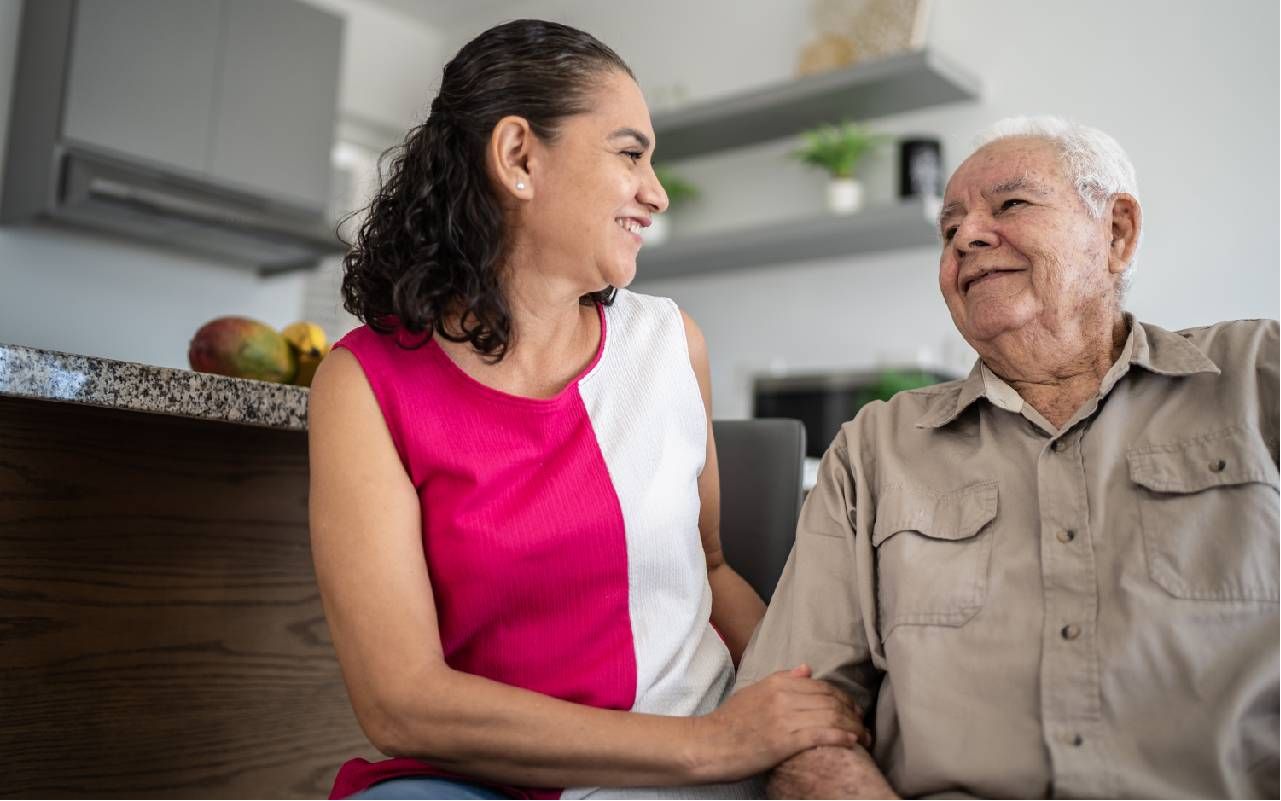Lessons in Caregiving
From being an advocate to finding peace, here are a few of the lessons I learned as a caregiver to my parents
As we were growing up, my parents let it be known to my sisters and me that they did not ever want to be placed in a care home. I did not realize it then, but they were like many Americans who want to "age in place" in their home and community.

When my parents, in their late 70s, became ill with several chronic and terminal health ailments, my sisters and I worked to support them and honor their wishes to age in their home.
According to the National Poll on Healthy Aging from the University of Michigan, 88% of people between the ages of 50 and 80 said it was very or somewhat important to them to live in their homes as long as possible. When my parents, in their late 70s, became ill with several chronic and terminal health ailments, my sisters and I worked to support them and honor their wishes to age in their home.
Like many adult children and family friends new to this process, we were unaware of everything we did not know about the complexity of safely aging in place and the available resources.
First, we added some safety features to their home and eliminated tripping hazards at their house. For example, we improved lighting, reduced clutter, and eliminated scatter rugs that did not have rubber backing. For more tips, see the National Council on Aging's resource guide to minimize falls. Here are a few other things I came to learn:
Align Health Systems
Before the end of their lives, we visited nearly every hospital emergency department in our area. We spent marathon days and nights wandering through the medical maze of the U.S. health care system. My parents and I had not considered the affiliations of their chosen physicians.
According to National Council on Aging research, nearly 95% of adults 60 and older have at least one chronic condition, while almost 80% have two or more. As such, a loved one might need their specialists to work together to review their case. Even if they are aging at home, they might be hospitalized at some point(s).
Often, coordination of care is very challenging. If one specialist is affiliated with one hospital system and another specialist is with a different one, it is more difficult for the patient and their loved ones to get timely consultations and answers. This can get more complicated as more of the body's systems (cardiology, pulmonary, neurology, etc.) and more specialists are involved.
Physicians from the same hospital system can more easily review digital records, and there isn't a need for duplicate tests. This can save time and money and streamline the hospital discharge protocol.
Be A Vocal (and Polite) Advocate
Being a vocal advocate can help your loved one immensely. This takes time from your responsibilities to attend and be a notetaker during doctor appointments. This also means assisting loved ones in entering their health portals and following up on test results, additional appointments and billing questions.
Like many adult children new to this process, we were unaware of everything we did not know about safely aging in place and the available resources.
It is beneficial to have a family member stay with the hospitalized patient as much as possible so this person can know what is happening and can "catch" the doctor or specialists when they appear briefly during their rounds. Families can designate one person in the family as the point person to speak with physicians and communicate family and patient history succinctly if necessary.
Get Help
Resources are available for families. Health care personnel can provide recommendations for the best contact for specific issues. If a patient is hospitalized, they are assigned a social worker and a patient advocate from the hospital, and they can provide recommendations and assist with patient navigation. However, persistence is vital.
County and state agencies also offer a plethora of information on their websites and through their offices. Use the Eldercare Locator to locate services in your area.
Evaluate Your Options
Through my family's journey, we consulted with some of these resources but had grown frustrated with the lack of coordinated care. Eventually, we hired an independent resource specialist in aging and disability (paid by the hour) to help us evaluate the best course of action for longer-term care.
Familiar with our region, the consultant met with our family, listened to what was happening, and then listed our options, such as part-time or full-time home health care, assisted living, nursing home, and in-patient facility-based hospice. We visited several places, interviewed home health companies, and were better informed to make decisions. We settled on part-time home health aides to offset the family caregiving duties.
Each family's situation is different. Family dynamics vary. Ideally, families can work together to help loved ones. This is not always easy because everyone is overloaded with work and family commitments. For example, one of our siblings lived out of town, and I was a single parent of two teenagers.
Be Gentle With Their Spirit
Now, years later, I recall the many times I said, "Be careful," or "slow down" or "are you sure that is a good idea?" and I feel slivers of regret. Time has allowed me to see that while I had the best intentions (and my parents knew I was motivated by love), my words might have felt like I was robbing them of their agency.
Preserving dignity and free will is essential to their spirit and the desire to continue living. I found that caregiving is a delicate balance between advocating for safety and not sending a message that makes the recipient feel like they are no longer an independent and valuable person.
Consider Quality of Life
As a family, we discussed health interventions and quality of life. Each person knows what that means to them and when treatment should be halted and palliative care initiated.
Allowing yourself to cry is okay, too
In time, my father and then my mother received hospice care. For Dad, my mother sensed when the end was near, and she reached out to hospice, which came and helped in his remaining days. As Mom's terminal cancer progressed, chemo treatments were stopped after numerous rounds and much deliberation. A hospice consult was scheduled.
It was not an easy decision for Mom, but her condition had progressed to the point where more care was needed than the home health aides could provide. With hospice, no more hospital visits or doctor appointments were required, simplifying things.
Hospice came several times weekly to check in on Mom, but other professional and family caregivers were also needed. She lived several months while receiving hospice, which could have been extended. The care she received made it possible for her to age in place as she wished, and for that, we are grateful.
Add Self-Care
When a caregiver is overwhelmed, it can be difficult to hear others suggest that you "take time to care for yourself." Exasperated, you might want to ask: Who has the time or energy? Yet, taking care of oneself allows one to care for others.
Sometimes, this self-care looks like sitting down and drinking water to keep hydrated or eating a small meal or snack. It could be pausing for a few minutes between activities to breathe slowly and deeply or taking a brief nap. Phoning a friend or family member to vent can also be rejuvenating. Allowing yourself to cry is okay, too.
Find Peace (If Possible)
A time comes when there is nothing left to do but hold their hand and sit beside them to honor their experience and their life. Looking back, I know we carried out their desire to age in place the best we could, which is comforting even though I miss them dearly.


